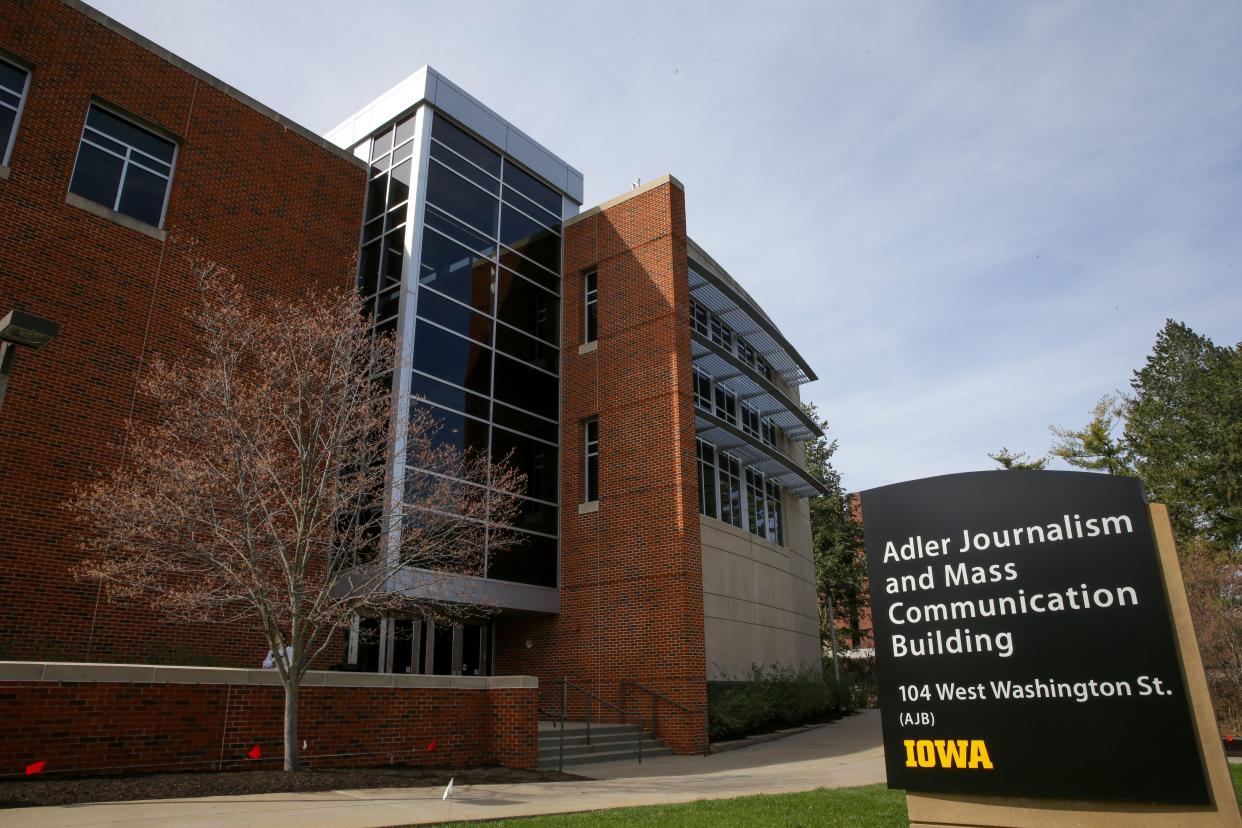Two UI professors address uncertainty, ethical and moral questions looming for journalism

Professors see ethical and moral questions and a whole lot of uncertainty lying ahead in the field of journalism.
The University of Iowa School of Journalism and Mass Communication surpassed the century mark earlier this spring, marking its 100th birthday with a celebration of the past, present and future.
The school inducted three alumni to its Hall of Fame, adding to an accredited list of journalism icons. At a celebratory dinner, speakers included current young student journalists with already prestigious resumés and tenured professionals with lengthy experience in some of the country's biggest markets.
More: The University of Iowa's journalism school is turning 100 this year. How it celebrated:
In the midst of the celebration, the Press-Citizen spoke to two seasoned professional journalists turned professors about the future of journalism as it adapts to fast-evolving technologies including artificial intelligence, and how they are adjusting their teaching to that fast-morphing landscape.
Deep fakes, disinformation, lying: Ethical dilemmas afoot
Meenakshi Gigi Durham spent years as a journalist and editor before coming to the University of Iowa. She holds a Ph.D. from the University of Florida and teaches courses on magazine writing, media ethics, gender and mass media and more.
Over her two decades in Iowa City, Durham has published four books and numerous scholarly articles exploring the moral and ethical guidelines and boundaries of journalism.
More: Iowa Supreme Court rules for University of Iowa, reverses $12.8 million payment to contractor
One of her books explored rape culture and the media, another the sexualization of young girls in media. Her most recent article explored the impact of photojournalism on the "napalm girl," a Vietnamese child seen fleeing, severely burned by napalm bombing, in a Pulitzer-winning 1972 photograph.
Durham has been tuned in to media ethics for decades. New technology is bringing even more ethical concerns to the forefront of media we consume each day, she said.
Ethical guidelines have "always been critical," she said.
"But they've changed in ways that we're only sort of starting to understand," she said. "How do we cope with these deep fakes? How do we cope with disinformation? How do we have prominent people who lie? Not that lying's new, but how do we deal with that?"
More: Longtime Czech heirloom, current Pagliai's Pizza home on doorstep of historic preservation
On the educational side, the emergence of AI and the explosion of new technologies over the past 15 years has forced the school of journalism to be "running as fast as we can to stay in the same place," Durham said. But to her, that's a good thing.
It's resulted in new faces in the program, people whom Durham describes as "digital natives," keeping a keen eye on the ever-evolving media landscape. In her view, they provide resources for students that outpace professional newsroom training on specific niches.
"I just feel like we're flourishing right now," she said, citing a deeper focus on community connection with the school's recent purchase of two eastern Iowa newspapers, fresh leadership and evolving curriculum to keep students as connected as possible to the changing media landscape.
'I'd have trouble predicting five years from now,' says retiring prof
Don McLeese unexpectedly found his way into teaching about two decades ago. The long-time journalist had spent decades racking up bylines across the country writing about music. Originally a record store owner, McLeese said that when he started, the journalism business was "a license to print money."
In his 20 years of teaching, McLeese said, the "hunger and need" for journalism has only continued to grow while the strong business model on which organizations had been built has collapsed.
That, coupled with some of the same fears shared by Durham, has fed into his uncertainty moving forward.
"I'd have trouble predicting five years from now," McLeese said.
More: Civil rights groups sue to block Iowa's new 'illegal reentry' immigration law
Despite that uncertainty, McLeese said he believes the J-school has remained anchored to the same general principles he taught before iPhones and learned before personal computers: reporting, storytelling and personability.
"We're not just a trade school," McLeese said. "We're not simply preparing people for jobs. Because whatever technology we have will likely be outdated by the time they're five years into their profession anyway. We have to train them to be able to recognize what the common elements are across the board."
McLeese is retiring from teaching at the end of the academic year but keeping his pen in hand wherever he sees fit to tell a story. He echoed Durham's belief that the university's School of Journalism and Mass Communication "is as strong or stronger than at any point in the 20 years I've been here."
That's down to keen instructors keeping focused on the key, static tenets of journalism education and the revolving door of new technology.
"We are capable of doing better journalism now than ever before with the resources we have at our fingertips," McLeese said. "...(And) we are vital in training not only the journalists of tomorrow but also the citizens of tomorrow."
Ryan Hansen covers local government and crime for the Press-Citizen. He can be reached at rhansen@press-citizen.com or on X, formerly known as Twitter, @ryanhansen01.
This article originally appeared on Iowa City Press-Citizen: UI professors see uncertainty, ethical questions for journalism ahead
